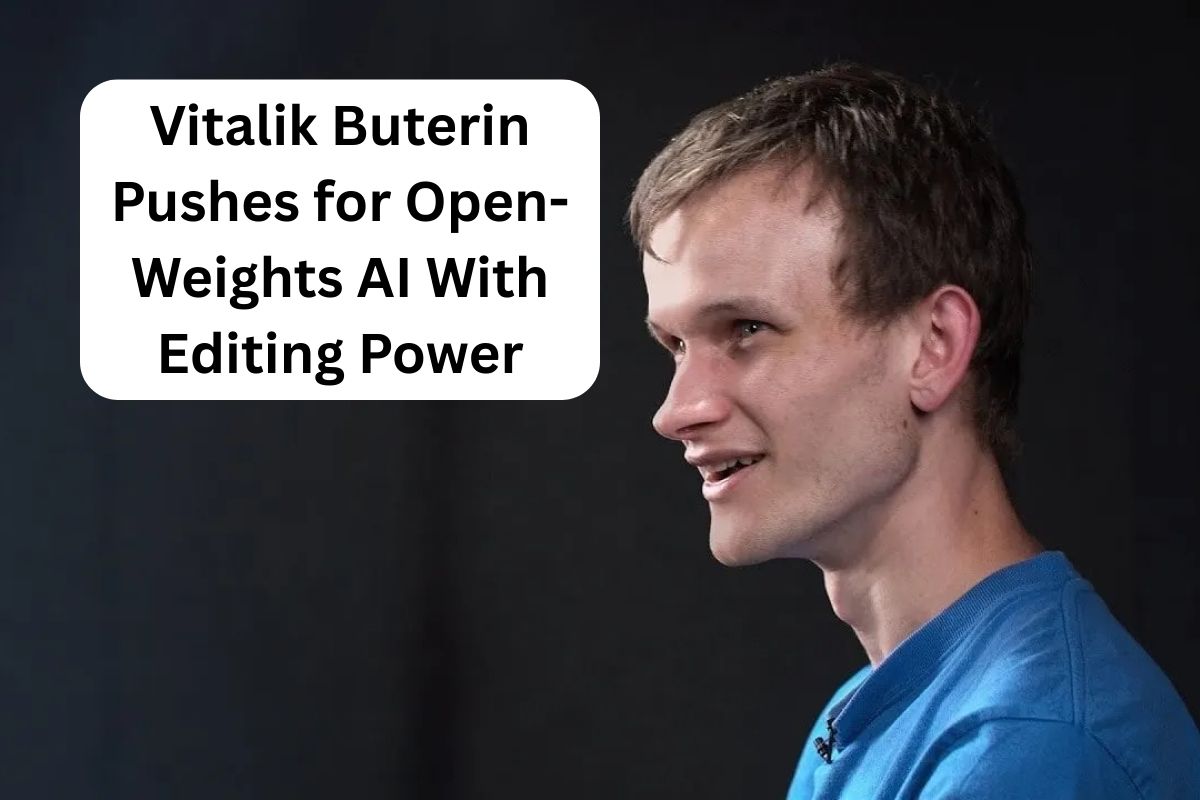Ethereum co-founder Vitalik Buterin is calling for a new direction in artificial intelligence development—one where open-weights AI models and editing power are central to innovation. His remarks come at a time when Big Tech companies are racing to dominate AI through closed systems, sparking debate over transparency, safety, and control.
Buterin’s push highlights a critical divide in the AI industry. While companies like OpenAI, Anthropic, and Google favor restricted access to powerful models, Buterin believes open-weights AI—where researchers and developers can freely study and modify AI systems—will encourage accountability and better long-term safeguards.
What Does Open-Weights AI Mean?
In AI development, “weights” refer to the learned parameters that determine how models make predictions and generate responses. Open-weights AI makes these parameters publicly available, unlike closed-weight models that guard them as proprietary secrets.
Buterin argues that giving editing power over AI systems could help society audit, improve, and adapt these models rather than relying on black-box systems controlled by a few corporations. By decentralizing AI, he envisions an ecosystem where independent researchers can monitor risks and correct harmful behaviors.
Why Is Editing Power Important?
The idea of editing AI models goes beyond transparency. It gives users the ability to customize systems to better align with cultural, ethical, or domain-specific needs. For example, a medical research team could fine-tune an open-weight AI model to provide more accurate healthcare insights, while watchdog groups could edit models to reduce bias or misinformation.
Buterin suggests that this kind of community oversight could help avoid scenarios where powerful AI is used irresponsibly by concentrated actors. It reflects a philosophy similar to open-source software, where shared access leads to stronger collective outcomes.
Table: Open-Weights AI vs. Closed-Weights AI
| Aspect | Open-Weights AI | Closed-Weights AI |
|---|---|---|
| Transparency | Public access to model parameters | Restricted, company-controlled |
| Innovation | Community-driven edits and improvements | Centralized corporate development |
| Safety & Oversight | Easier auditing and risk monitoring | Harder to verify internal functioning |
| Customization | High—users can edit for specific needs | Low—limited by corporate release |
| Market Control | Decentralized and diverse participation | Concentrated in a few tech companies |
The Risks of Open-Weights AI
Critics warn that open-weights models could also empower malicious actors, enabling bad-faith edits that increase harmful outputs, spread disinformation, or create autonomous systems with little oversight. This risk has been a key argument for companies defending closed AI systems.
Buterin acknowledges these dangers but stresses that responsible editing frameworks and governance structures could balance openness with safety. He also emphasizes that closed systems carry their own risks by concentrating power in the hands of a few corporations, which may prioritize profit over global well-being.
How Buterin’s Blockchain Vision Ties In
Buterin’s views on open AI connect naturally with his background in decentralized technologies. Ethereum has long championed transparency, trustless systems, and community governance. Extending these principles to AI could lay the foundation for what he calls a “decentralized AI commons”, where access and editing power are distributed rather than monopolized.
This vision aligns with ongoing discussions around integrating blockchain tools to track AI edits, verify authenticity, and maintain accountability across global networks. Such a system could help society manage both the opportunities and threats of powerful AI.
Industry and Global Reactions
So far, responses to Buterin’s proposal are mixed. Some researchers support the call for openness, arguing that open-weights models will democratize AI innovation in the same way open-source software transformed computing. Others remain cautious, pointing out that security and misuse risks are significantly higher without centralized oversight.
Governments are also beginning to weigh in. As regulatory frameworks emerge in the U.S. and Europe, the debate over open vs. closed AI will likely influence new policies. Whether Buterin’s vision becomes mainstream depends not just on developers, but also on how regulators choose to balance innovation with control.
Vitalik Buterin’s advocacy for open-weights AI with editing power is reshaping the debate on how humanity should develop and govern advanced intelligence. While critics point to risks of misuse, supporters argue that decentralized access ensures transparency and collective oversight. The coming years will likely determine whether AI follows a path of centralized control or community-driven accountability, and Buterin’s vision may play a decisive role in shaping that future.
FAQs on Vitalik Buterin’s AI Push
Q1. What is Vitalik Buterin’s stance on AI?
He advocates for open-weights AI with editing power, ensuring transparency and decentralized innovation.
Q2. Why does he support editing power in AI?
Editing power allows communities to fix bias, customize AI, and improve oversight.
Q3. How is this different from OpenAI’s approach?
OpenAI focuses on closed-weight models, restricting access to internal parameters for safety and profit.
Q4. What are the risks of open-weights AI?
Misuse by malicious actors, disinformation risks, and lack of centralized control are major concerns.
Q5. How does blockchain fit into this vision?
Blockchain can track edits, verify integrity, and provide governance for decentralized AI systems.
